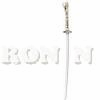Need help to solve maths
Need to solve integral (S - integral's symbol) with accuracy 10^(-5)
2
S(e^(-x^3))dx
0
Anybody knows how to solve it? I know that S(e^(-x^3))dx = x*(1 - x^3/4*1! + x^6/7*2! - x^9/10*3! + x^12/13*4! - x^15/16*5! + ...). But to solve it with needed accuracy I need to count first 27 members of row... Ofc there is programm like MathCAD but may be anybody knows more easy formula to solve it?
Thx
I'm here buddy ![]()
Just call me Maths ![]()
Mehehe ![]()
Sorry, I'm too lazy to go back in my maths courses ![]()
i dont know how youve learned to integrate but its the opposite of differentiation AFAIK...
[e^(-x^3) ]' = e^(-x^3)*(-3x²)
turn it around
S{e^(-x^3)] dx = e^(-x^3)/(-3x²)
but that would not be possible in [0;2] as long as you haven't divided through zero yet.
but its been ages i needed to know this so no guarantee.
this thread has info on e^-(x^2) so its kinda similar ![]()
pff, man... 1+1=2 its obvious!
@Shell
U are wrong. It's row for 100% and what U wrote is not correct.
Just try to find (e^(-x^3)/(3x²))' It won't be (e^(-x^3))@Tyrant
There is only integrate there. the problem is to count that cause I need to count 1st 27 members in row! It's easy if integral were form 0 to 1/2 (cause I have such example in book). But the rule from the book doesn't work in my case cause at first members of row are getting more and only from 1x member goes to 0. And than integral from 0 to 1/2 they always goes to 0...
yup i realised ![]() i thought the exact other way
i thought the exact other way ![]()
use u-substitution to make integral Se^u.du where u=-x^3 so calculate du=... then substitute it into the calculated integral. if you want you can even convert the new limits (i.e. u=-2^3 and u=-0^3) and you will get your answer
you should be able to work it out. (remember you dont need to worry about adding a constant at the end cos you have limits on the integral)
i havent worked it out myself yet, but i think that's how it can be done (been a while since i did calculus... about 7 years)
good luck.
Check out the big brain on Yas dud.
Check out the big brain on Yas dud.
at least you weren't looking at my breasts... oh wait...
*sigh* i'm an artist stuck in a mathematicians body... a lover and a killer... and extemely flatulent.
hazo, if you need me to go through it with workings out and everything, just ask... i'll try and clear the cobwebs from my memory and help out.














@Shell
U are wrong. It's row for 100% and what U wrote is not correct.
Just try to find (e^(-x^3)/(3x²))' It won't be (e^(-x^3))
@Tyrant
There is only integrate there. the problem is to count that cause I need to count 1st 27 members in row! It's easy if integral were form 0 to 1/2 (cause I have such example in book). But the rule from the book doesn't work in my case cause at first members of row are getting more and only from 1x member goes to 0. And than integral from 0 to 1/2 they always goes to 0...